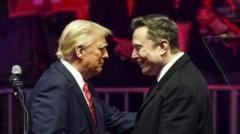In a stunning set of developments, Elon Musk has not only clarified his unexpected role within the Trump administration but has emerged as a pivotal, dominant force steering changes in the U.S. government. Describing himself on the social media platform X as "Tech Support," Musk's leadership in the newly minted Department of Government Efficiency (Doge) has set the stage for dramatic reforms that have quickly shaken the foundations of federal operations.
Within just two weeks of the administration's commencement, Musk has unleashed ambitious initiatives such as attempting to wrestle access to the federal payment system from entrenched agencies and proposing the closure of USAID—an agency with a long history of championing international development. His aggressive approach has drawn scrutiny and concerns from both employees and political analysts, given the stark departure from established procedures and the potential violation of legal frameworks that safeguard agency independence.
With Musk’s considerable financial backing of Trump’s campaign and eventual presidency, the tech mogul's influence has taken shape in the corridors of power, compelling civil servants to adapt to a culture shock resonant of Silicon Valley startups. Internal reports reveal fears among USAID staff as Musk labeled the agency a "criminal organization," leading to a suspension of operations and the abrupt withdrawal of personnel from global assignments.
Legal scholars are questioning the legitimacy of Musk's unprecedented authority to commandeer government functions, suggesting that his push to close down USAID may violate congressional mandates. However, Republican lawmakers appear largely supportive of Musk and Trump's restructuring attempts, raising further questions about the implications for governance in the U.S.
Amidst praise and criticism, the tech industry stands at a crossroads, left bewildered by Musk's takeover of a federal agency as he catalyzes sweeping changes that many CEOs previously deemed unacceptable. Former associates of Musk express concerns that his infamous work habits and disruptive style may culminate in the destabilization of core governmental institutions, with some fearing that his ultimate objective may tilt towards an insatiable desire for control.
As the dust begins to settle on this unprecedented upheaval, the reverberations of Musk’s actions signal a potential collision between a billionaire with an ambitious vision and a president attempting to wield authority from the Oval Office. The future dynamics between Musk, Trump, and U.S. governance remain murky, with ongoing debates suggesting that, as dynamics evolve, a future showdown may be inevitable.
Within just two weeks of the administration's commencement, Musk has unleashed ambitious initiatives such as attempting to wrestle access to the federal payment system from entrenched agencies and proposing the closure of USAID—an agency with a long history of championing international development. His aggressive approach has drawn scrutiny and concerns from both employees and political analysts, given the stark departure from established procedures and the potential violation of legal frameworks that safeguard agency independence.
With Musk’s considerable financial backing of Trump’s campaign and eventual presidency, the tech mogul's influence has taken shape in the corridors of power, compelling civil servants to adapt to a culture shock resonant of Silicon Valley startups. Internal reports reveal fears among USAID staff as Musk labeled the agency a "criminal organization," leading to a suspension of operations and the abrupt withdrawal of personnel from global assignments.
Legal scholars are questioning the legitimacy of Musk's unprecedented authority to commandeer government functions, suggesting that his push to close down USAID may violate congressional mandates. However, Republican lawmakers appear largely supportive of Musk and Trump's restructuring attempts, raising further questions about the implications for governance in the U.S.
Amidst praise and criticism, the tech industry stands at a crossroads, left bewildered by Musk's takeover of a federal agency as he catalyzes sweeping changes that many CEOs previously deemed unacceptable. Former associates of Musk express concerns that his infamous work habits and disruptive style may culminate in the destabilization of core governmental institutions, with some fearing that his ultimate objective may tilt towards an insatiable desire for control.
As the dust begins to settle on this unprecedented upheaval, the reverberations of Musk’s actions signal a potential collision between a billionaire with an ambitious vision and a president attempting to wield authority from the Oval Office. The future dynamics between Musk, Trump, and U.S. governance remain murky, with ongoing debates suggesting that, as dynamics evolve, a future showdown may be inevitable.




















